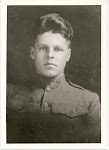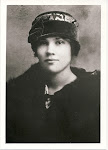August 31, 2010
France August 29, 1918
This is Roy's first letter from "over there." He seems to be excited, as he says he enjoyed his trip and expects to like France. This is also the first letter to show direct reference to military censorship. From this point forward, his letters are spaced further apart, as the time it took for them to reach the US and receive a response from Stella was quite long.
Dear Friend:
Perhaps you are wondering at not having heard from me for some time but the beginning of this letter should partly explain it. So will you please pardon the delay. You see I am at last 'Over There,' as we used to say in the States, and, though I have seen very little of the country, I believe I shall like it for a time, anyway.
It is a picturesque looking country and the people are an old-fashioned looking lot. Of course, I have seen very little yet and believe things are quite different in the different parts of the country. The French language seems, to me anyway, very hard to learn and and understand. I am going to try to learn to speak a little French, anyway.
We have a young fellow in our Squadron who can speak French very well. In fact he is a French American and spent part of his boyhood in France. He says he was born in San Francisco and came over here when he was quite young and was here about twelve years, so he can give the rest of the bunch some good pointers in French. So while you are studying your music and singing I will be trying to learn to speak French and doing my bit too. Ha Ha. How are the singing lessons going?
We had fine weather for our voyage, except one day or so when it rained, but I think all enjoyed the trip. I know I did. I was expecting to be seasick on the trip but did not mind it at all. I think the fine weather accounted for it. Were I able to tell you all about our trip I know I could write a long letter, but I shall try to remember most of it and have that much more to tell you when I return.
When you write me spell out the A.E.F. as those letters also stand for Australian E.F and there is a chance for a mistake. Give my regards to all and I shall look forward to a big letter.
Most Sincerely,
Roy D.
#764480 My address Sg. Roy J. Diehl 281st Aero Squadron American Expeditionary Forces. France
Dear Friend:
Perhaps you are wondering at not having heard from me for some time but the beginning of this letter should partly explain it. So will you please pardon the delay. You see I am at last 'Over There,' as we used to say in the States, and, though I have seen very little of the country, I believe I shall like it for a time, anyway.
It is a picturesque looking country and the people are an old-fashioned looking lot. Of course, I have seen very little yet and believe things are quite different in the different parts of the country. The French language seems, to me anyway, very hard to learn and and understand. I am going to try to learn to speak a little French, anyway.
We have a young fellow in our Squadron who can speak French very well. In fact he is a French American and spent part of his boyhood in France. He says he was born in San Francisco and came over here when he was quite young and was here about twelve years, so he can give the rest of the bunch some good pointers in French. So while you are studying your music and singing I will be trying to learn to speak French and doing my bit too. Ha Ha. How are the singing lessons going?
We had fine weather for our voyage, except one day or so when it rained, but I think all enjoyed the trip. I know I did. I was expecting to be seasick on the trip but did not mind it at all. I think the fine weather accounted for it. Were I able to tell you all about our trip I know I could write a long letter, but I shall try to remember most of it and have that much more to tell you when I return.
When you write me spell out the A.E.F. as those letters also stand for Australian E.F and there is a chance for a mistake. Give my regards to all and I shall look forward to a big letter.
Most Sincerely,
Roy D.
#764480 My address Sg. Roy J. Diehl 281st Aero Squadron American Expeditionary Forces. France
August 12, 2010
Hiatus
You may have noticed a lack of letters in recent weeks. Though delays have usually been due to my own inattention, this particular one is due to the fact that, at this time in 1918, Roy J. Diehl was making his way--along with the rest of the 281st--to France. His first letter to Stella from France wasn't written until August 29th, 4 days after the U.S. transport "Matsonia," on which several squadrons crossed the Atlantic, arrived in the Port of Brest.
The ship left Hoboken, N.J. on August 11th, 1918, along with 7 other transports, three destroyers, one cruiser, two hydroplanes and one observation balloon.
The ship left Hoboken, N.J. on August 11th, 1918, along with 7 other transports, three destroyers, one cruiser, two hydroplanes and one observation balloon.
Subscribe to:
Posts (Atom)


